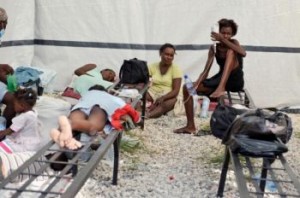 AFP reported: a cholera epidemic in northern and central Haiti has taken at least 220 lives and has now spread to the capital Port-au-Prince. Five cases of cholera were confirmed in the Haiti capital on Saturday, a UN spokesperson told CNN.The source of the epidemic is believed to be the Artibonite River, used by thousands for washing and cooking.
AFP reported: a cholera epidemic in northern and central Haiti has taken at least 220 lives and has now spread to the capital Port-au-Prince. Five cases of cholera were confirmed in the Haiti capital on Saturday, a UN spokesperson told CNN.The source of the epidemic is believed to be the Artibonite River, used by thousands for washing and cooking.
The bacterial-borne disease is easily spread via contaminated food or water, especially in areas without sewage treatment and clean drinking water.
Eric Lotz, Haiti’s national director for the nonprofit Operation Blessing, told CNN that the hospitals in and around St. Marc were full of cholera victims and their families seeking care. He compared the scene to the aftermath of January’s earthquake.
“It’s the same scene, without the wounds, just the same numbers of people inundating the hospital,” he said.
Doctors Without Borders plans to set up a field hospital in St. Marc, according to AFP. Oxfam has sent five emergency specialists to Artibonite to implement water, sanitation and hygiene programs for around 100,000 people. Aid agencies are also dispatching supplies including antibiotics, water purification tablets, jerry cans, buckets, and hygiene kits.
The Pan American Health Organization said the epidemic is still contained within Haiti, AFP reported. However, the government is mobilizing a contingency plan while the border between Haiti and the Dominican Republic is still open.